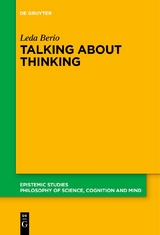Talking About Thinking
Language, Thought, and Mentalizing
Seiten
2021
De Gruyter (Verlag)
978-3-11-074843-7 (ISBN)
De Gruyter (Verlag)
978-3-11-074843-7 (ISBN)
This series is devoted to publishing books in the fields of epistemology, philosophy of mind, philosophy of language, and philosophy of science. It is an outstanding platform for state of the art contributions. The studies are carried out in an argumentative style and advance current debates in a significant manner. While the main publication language is English, we also welcome German language submissions. All books are peer-reviewed.
Our ability to attribute mental states to others ("to mentalize") has been the subject of philosophical and psychological studies for a very long time, yet the role of language acquisition in the development of our mentalizing abilities has been largely understudied. This book addresses this gap in the philosophical literature. The book presents an account of how false belief reasoning is impacted by language acquisition, and it does so by placing it in the larger context of the issue, how language impacts cognition in general. The work provides the reader with detailed and critical literature reviews, and draws on them to argue that language acquisition helps false belief reasoning by boosting the ability to create schemata that facilitate processing of information in some social contexts. According to this framework, it is a combination of syntactic clues and cultural narratives that helps the child to solve the classic false belief task. The book provides a novel, original account of how language helps false belief reasoning, while also giving the reader a broad, precise and well-documented picture of the debate around some of the most fundamental issues in social cognition.
Our ability to attribute mental states to others ("to mentalize") has been the subject of philosophical and psychological studies for a very long time, yet the role of language acquisition in the development of our mentalizing abilities has been largely understudied. This book addresses this gap in the philosophical literature. The book presents an account of how false belief reasoning is impacted by language acquisition, and it does so by placing it in the larger context of the issue, how language impacts cognition in general. The work provides the reader with detailed and critical literature reviews, and draws on them to argue that language acquisition helps false belief reasoning by boosting the ability to create schemata that facilitate processing of information in some social contexts. According to this framework, it is a combination of syntactic clues and cultural narratives that helps the child to solve the classic false belief task. The book provides a novel, original account of how language helps false belief reasoning, while also giving the reader a broad, precise and well-documented picture of the debate around some of the most fundamental issues in social cognition.
lt;p> Leda Berio, Heinrich-Heine-Universität Düsseldorf, Düsseldorf.
| Erscheinungsdatum | 20.07.2021 |
|---|---|
| Reihe/Serie | Epistemic Studies ; 49 |
| Zusatzinfo | 1 b/w ill., 4 b/w tbl. |
| Verlagsort | Berlin/Boston |
| Sprache | englisch |
| Maße | 155 x 230 mm |
| Gewicht | 553 g |
| Themenwelt | Geisteswissenschaften ► Philosophie ► Erkenntnistheorie / Wissenschaftstheorie |
| Schlagworte | Cognitive Development • Kognitive Entwicklung • Language acquisition • Philosophie der Psychologie • philosophy of psychology • Social Cognition • Soziale Kognition • Spracherwerb |
| ISBN-10 | 3-11-074843-6 / 3110748436 |
| ISBN-13 | 978-3-11-074843-7 / 9783110748437 |
| Zustand | Neuware |
| Haben Sie eine Frage zum Produkt? |
Mehr entdecken
aus dem Bereich
aus dem Bereich
die Grundlegung der modernen Philosophie
Buch | Softcover (2023)
C.H.Beck (Verlag)
18,00 €
Buch | Softcover (2023)
Reclam, Philipp (Verlag)
7,00 €



![Was heißt Denken?. Vorlesung Wintersemester 1951/52. [Was bedeutet das alles?] - Martin Heidegger](/media/113619842)
